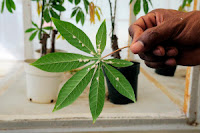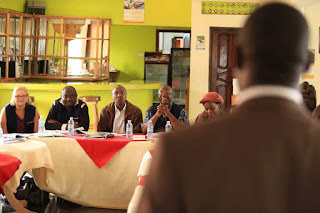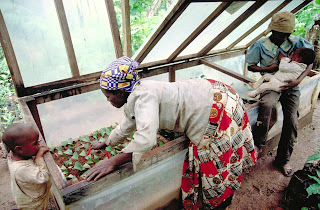An IFAD project is helping to thwart food security threats
What do wasps and the International Fund for Agricultural Development (IFAD) have in common?
Both of them are fighting to curb the threat to food security, particularly in South-east Asia and Indonesia.
Cassava is a well-known staple food and in South-east Asia it is the third-largest source of calories after rice and maize. It is a key crop in Indonesia, a nation which is among the world’s major cassava producers.
The country sees more than one million hectares of cassava planted every year, half of which is directly consumed as food, and the crop supports an estimated 40 million people. It's also a very significant source of income in the region. In 2014, for example, Viet Nam's export of cassava amounted to US$1.3 billion.
The plant's value is built on its many and varied uses. Directly or indirectly, cassava is an essential support for smallholder incomes, so keeping the plant healthy is vital.
But smallholder farmers across the world are faced with a big problem. And the problem is called the mealybug (phenacoccus manihoti. Mealybugis one of the most virulent cassava pests globally. The pill-shaped invader sucks sap from crops causing them to wither and die.
In the 1980s, mealybug, also known as the pink mealybug, almost eliminated African cassava and severely threatened the food security of the region. During this period the farmers faced record yield losses of up to 82 per cent.
How did the African smallholder farmers fight this the problem?
Here comes our hero: angyrus lopezi, aka the parasitic wasp
This program is part of a much bigger project addressing cassava threats and diseases in the region, funded by the European Commission (EC), through IFAD and other strategic partners under the EC/CGIAR Programme.IFAD has been managing the'Emerging Pests and Diseases of Cassava in South East Asia: seeking eco-efficient Solutions to Overcome a Thread to Livelihoods'projectwhich is funded by the EC under the EC/CGIAR Programme.
Parasitic wasp is the natural enemy to the pink mealybug and its introduction is considered as one of the most successful pest-control programmes in the world.
Recently, pink mealybug spread throughout South-east Asia, and once again presenting a catastrophic threat to cassava-based livelihoods and food security.
But this time, 3,000 tiny parasitic wasps took part in a major 'sting'. The first stage of the project was to release the wasps in an infected field in Indonesia. Nature took its course and they deposited their eggs. The hatching larvae consumed the mealybugs from the inside, slowly mummifying and killing them. The wasps quickly adapted to local conditions and reproduced, and they were then released into an open field.
Eliminating the pest in its early phase is vital to ensure continued economic prosperity for millions of farmers and this was the first stage of a larger eradication campaign. And the method is also environmentally friendly ̶ it doesn't involve any spraying of pesticides and the wasps pose no threat to humans, animals or other insects because they only feed on the cassava mealybug.
Cassava is a crucial crop, and depending on the region, is prepared in different ways. The boiled root is similar in taste to potato. Once mashed and sieved, it can be used as flour, as porridge or tapioca, or as a thickening agent. Industrially, there is a growing demand for cassava pellets for animal feed. Furthermore it can be distilled to produce alcohol; and it has a variety of uses in the pharmaceutical and cosmetic industries. And the starch is used to make paper, wood and textiles.
 |
| Mealybug infestation on a cassava leaf/Neil Palmer - CIAT |
This is an example of using nature itself to overcome the threat to food security (with a little help from IFAD).






 “Climate change is an issue of survival,” declared H.E. Anote Tong, President of Kiribati, the keynote speaker at the United Nations System side event co-sponsored by WMO on “Science-based climate information – building on evidence to implement policies,” on 4 December at COP21.
“Climate change is an issue of survival,” declared H.E. Anote Tong, President of Kiribati, the keynote speaker at the United Nations System side event co-sponsored by WMO on “Science-based climate information – building on evidence to implement policies,” on 4 December at COP21.


















































